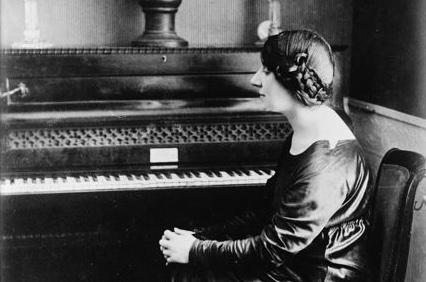📕 Review: 10 Keynotes of Piano Pedagogy
For some reason, when I put Chopin's name in the title of this post, the thumbnail will not show up on my main page. So this should be titled 10 Keynotes of Frederic Chopin's Piano Pedagogy.
I recently read Chopin: pianist and teacher as seen by his pupils by Jean-Jacques Eigeldinger. Chopin had about 150 pupils in total, which is pretty incredible considering his many compositions and performances; and, he only lived until he was 39. In this book, his students share their experiences and the specific teachings of Chopin.
Here are the 10 most important takeaways that I'm actively applying.
Teaching Hand Shape
Singing with the Fingers and Breathing with the Wrist
Teaching Rubato
Inspiring Students
- For legato - avoid a pigeon hunt
- For staccato - think of pizzicato or plucking a string and grazing the key like a fly brushing it with it's wing
Playing Pieces for Students
Advocating for Shorter Practice Times
Being Self-Taught Is Not a Weakness
Purpose of Technique Books
Expression over Accuracy
Finding Joy in Piano Teaching
Many methods teach beginners to pretend they are holding a ball or apple under their hands. Others mention keeping your fingers rounded, playing on fingertips, and keeping your wrist level.
Chopin's instructions were to place fingers 2, 3, and 4 on the three black keys. Then place fingers 1 and 5 on the black keys. This is your natural hand shape. To play on the white keys only, gently pull your hand towards you and maintain the hand shape.
Forearms should be level with the piano and the wrist needs to stay flexible. In addition to that, he taught that the 2nd finger was the center of the hands; turning my hand out has actually helped with playing his music, but it is awkward to maintain since that is not how I learned.
You must sing if you wish to play - Chopin
Chopin was a huge fan of opera singers and specifically the bel canto style of singing. By singing our piano pieces, we can hear our natural tendency to crescendo and decrescendo, to take extra time preparing for leaps, and have a freedom from the accompaniment to push and pull the tempo; an effective way to learn how to play rubato.
Along with singing with the fingers, Chopin also taught students to create the impression of human breathing. He taught students not to lift their hands too quickly and would ask,
Did it burn you?
Legato playing was also emphasized. Playing detached would lead to Chopin asking if they were hunting pigeons.
I don't know about you, but when I was taught rubato, the only definition I had was to push and pull the tempo. Listening to interpretations of Romantic music, I would often hear the artist use both hands simultaneously to push and pull the tempo. This sounded great to me! However, my execution often ended up being a cover for my less than stellar sense of rhythm and maintaining an even, steady beat.
How did Chopin teach rubato? He noticed that singers didn't always stick with the accompanist's tempo, therefore his definition of rubato is the melody is free from metrical constraints leading to the artist being able to freely express their feelings.
So, if you thought teaching hand independence was difficult, just wait until you teach rubato for Chopin's compositions!
Chopin used images to convey emotion. Chopin's own imagery included
I have practically applied this by telling beginner students that spiders can only crawl with rounded legs. Don't be a smashed spider! Use a hammer-like touch for accents and forte, but gently pet a cat to create soft sounds.
Chopin would play piano pieces, including his own compositions, many times for his students in full. This is encouragement to us to also play for our students! Don't be shy! I think we may focus more on how to get through the method material or marking up the students' scores, but students need to see how technique and expression are applied.
Chopin advocated for practice sessions to be no longer than 2 hours a day. He actually was angry with a student for reporting practicing longer than that. Why? Because he was very against being mechanical and he believed practicing more than 2 hours caused the student to lose expression and musicality to exhaustion.
I spend time on Reddit's r/piano subreddit. Many users have reported being told that they will have created too many bad habits from self-teaching that a teacher will not accept them into their studio.
I will admit, I was self-taught for my early years. I did have bad habits. I, perhaps wrongly, perceived my high school piano teacher reluctantly taking me on as a student given my patchy background. Why can't we as piano teachers have the patience to help a student sort out bad habits? Are we worried about tarnishing our reputation?
Chopin was self-taught and his eventual piano teacher was a violinist. See how that worked out for him? A well-respected composer, teacher, and performer, remembered nearly 200 years after his death. Please don't underestimate self-taught individuals.
In my own story, after a failed audition for a university, my dad recalls I was told that I didn't have the expected background of a future music major. When a different college accepted me, I thought it was because they felt bad for me and unfortunately, I carried that sadness for many, many years. I didnt feel as though I belonged and that I was simply given the spot because the professors felt bad for me. Kindness is free. Imagine how a student can thrive if they have your encouragement.
Chopin was not a fan of training mechanical technique. Technique and expression work together. Therefore, the technique exercises he preferred weren't trying to create a perfect evenness between fingers, but challenging artistry to shine through even the most difficult passages. He actually prized the individuality in tone each finger could produce. We can hear that in his Etudes. They are performance literature for a reason! Practically speaking, Chopin assigned Clementi's Préludes et Exercises and Gradus, Cramer Études, and Moscheles Op. 95 or 70 for technique.
From the earliest levels, I have been drilling this into my students. Better to focus on the dyanmics, articulations, and putting your emotions into music than play robotic, trying to be perfect, and correct any and every mistake. I ask for my students to continue playing despite mistakes, cover the mistake if they are able, and, since we are still practicing the piece, we go back in and work on the problem spot. This is to train them to perform. We all make mistakes when we are performing; develop the skill of covering and the audience will not notice.
Have you ever been told
Those who can, do; those who can't, teach.
Ridiculous, I know that now, but I was told by a student that his grandpa said that about me. His grandpa didn't know me, but even if he did, those words are not true. Chopin stopped giving performances due to anxiety about being on stage (another way I related to him!), but I don't think any of us would consider him someone who "can't" simply because he became a teacher full-time. He gave excellent performances of his works to his students. He continued composing. Teaching is an amazing career and rewarding. Don't let someone undermine your accomplishments.
- Bonus! Chopin's Curriculum
- John Field
- Concertos 1, 3, 4
- Nocturnes
- Weber
- Sonatas in C (op. 24)
- Sonatas in A-flat (op. 39)
- Hummel
- Rondo brilliant op. 98
- La Bella Capriciosa, op. 55
- Sonata in F# minor, op. 81
- Concertos in A minor and B minor
- Septet op. 74
Specifically lesser known repertoire
In conclusion, I found these points to be so encouraging and helpful for practical applications and for creating a positive mindset. I highly recommend picking up this book. It is priced as a textbook, so I suggest doing what I did: use your library or your library's interlibrary loan service to borrow a copy.
What books have helped you grow as a piano teacher? Please share them in the comments!




